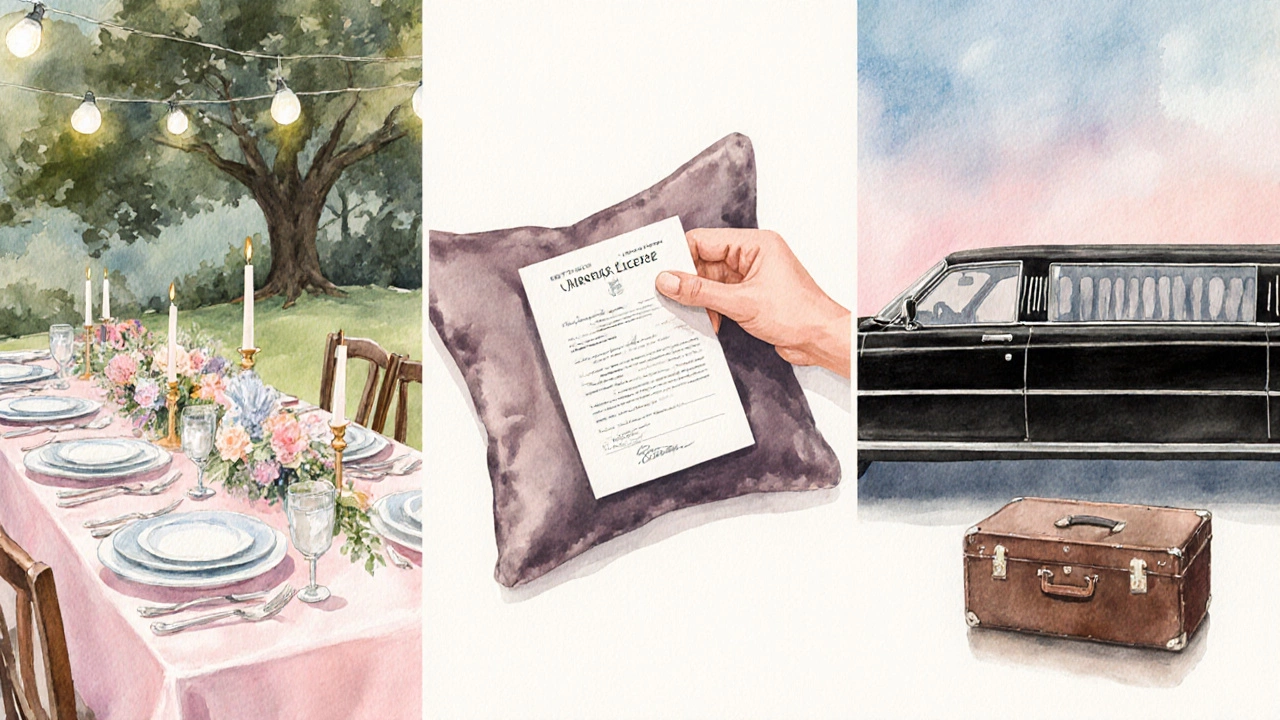Wedding Cost Calculator
Estimate Wedding Costs for Groom's Parents
Enter your total wedding budget and select which items you want to include to see how costs are typically allocated between families.
Estimated Cost Breakdown
Key Takeaways
Based on traditional practices, groom's parents typically cover:
- Rehearsal Dinner, Transportation, Groom's Attire, and Out-of-town Accommodations
Planning a wedding is a juggling act of dates, vendors, and family expectations. One of the biggest questions that pops up early on is: groom's parents wedding costs. Understanding what the groom’s family typically funds helps avoid awkward conversations and keeps the budget on track.
Traditional Division of Expenses
Before modern twists, most cultures had a clear split: the bride’s side covered the ceremony and reception, while the groom’s side handled the rehearsal dinner and a few other items. Today, couples often blend traditions, but the baseline responsibilities still serve as a useful starting point.
Groom's parents are the father and mother of the groom, traditionally tasked with specific wedding expenses. Their contribution usually reflects both cultural customs and the couple's personal preferences.
On the flip side, Bride's parents traditionally cover the bulk of the ceremony and reception costs. Knowing who usually pays for what creates a baseline for open budgeting talks.
Core Items Typically Covered by Groom's Parents
Here’s a checklist of the most common responsibilities that fall on Groom's parents:
- Rehearsal Dinner - The evening before the wedding, often hosted at a restaurant or a family home.
- Marriage License - A legal requirement; many couples ask the groom’s family to take care of the filing fee.
- Transportation - Limo rides for the groom, his family, and sometimes the bride’s party from the ceremony to the reception.
- First Dance Song - Some couples choose the groom’s parents to cover the cost of a live musician or a special recording for this moment.
- Wedding Attire for the Groom - This can include the suit, shoes, and accessories, especially if the bride wants a coordinated look.
- Accommodation for Groom’s Out‑of‑Town Guests - Paying for hotel rooms or a block of rooms for family traveling to the ceremony.
These items form the backbone of the groom’s family budget and are usually the first line items discussed in early planning meetings.
Optional Extras Groom's Parents May Contribute
Beyond the core list, many families opt to add a few “nice‑to‑have” touches. These are not required, but they can make the day feel more personalized.
- Wedding Rings - While traditionally a personal purchase, some groom’s parents step in to help with the cost.
- Welcome Bags for Out‑of‑Town Guests - A curated set of snacks, a local map, and a schedule of events.
- Family Photo Session - Hiring a photographer for a pre‑wedding portrait of both families.
- Live Stream Services - Paying for a professional crew to broadcast the ceremony to relatives who can’t attend.
- Gift for the Bride - A thoughtful present that reflects the groom’s family’s appreciation.
These extras can be tailored to the couple’s priorities and the overall budget. It’s best to discuss them early, so expectations stay realistic.

Budgeting Tips for Groom's Parents
Managing a wedding budget can feel like a full‑time job. Here are some practical ways for the groom’s family to stay on top of costs:
- Start with a Spreadsheet - List every expected expense, assign a responsible party, and track actual spend versus estimate.
- Get Multiple Quotes - Whether it’s a venue for the rehearsal dinner or a transportation company, three quotes provide a solid bargaining position.
- Leverage Relationships - If a family member runs a catering business, ask for a discount or a “family rate.”
- Set a Hard Cap - Determine the maximum amount you’re comfortable spending before negotiations begin.
- Consider a Wedding Planner - A professional can often negotiate better rates and keep the budget on track, saving money in the long run.
Remember, the goal isn’t to skimp on the experience but to allocate funds where they have the biggest impact.
How to Discuss Money with the Bride's Family
Money conversations can be delicate, but clear communication prevents misunderstandings later on. Follow these steps:
- Schedule a Joint Meeting - Invite both sets of parents, the couple, and (if needed) a planner to go over the budget.
- Share a Transparent Spreadsheet - Everyone sees the numbers, which builds trust.
- Identify Overlaps - For example, both families might want to contribute to the music. Agree on a split or let one side take the lead.
- Respect Cultural Norms - Some traditions dictate specific responsibilities; honor those while remaining flexible.
- Document Agreements - A quick email recap ensures that everyone remembers what was decided.
Open dialogue keeps the focus on the celebration, not the checkbook.

Comparison Table: Who Typically Pays What?
| Expense Category | Bride's Parents | Groom's Parents |
|---|---|---|
| Venue (ceremony) | Usually | Rarely |
| Reception venue & décor | Usually | Rarely |
| Rehearsal dinner | Occasionally | Usually |
| Marriage license | Sometimes | Usually |
| Transportation (limos/buses) | Sometimes | Usually |
| Catering (food & beverage) | Usually | Occasionally |
| Photography & videography | Usually | Sometimes |
| Wedding attire (groom & groomsmen) | Sometimes | Usually |
| Wedding rings | Occasionally | Sometimes |
| Accommodation for out‑of‑town guests | Sometimes | Usually |
The table isn’t a hard rule, but it captures the most common patterns in U.S. weddings today. Couples can shift responsibilities based on income, preferences, or cultural expectations.
Frequently Asked Questions
Do groom's parents have to pay for the wedding dress?
Usually no. The bride’s family or the bride herself typically covers the dress. However, if the couple wants to share costs, the groom’s parents can contribute.
What if the groom’s family can’t afford the traditional items?
Open communication is key. The couple can reassign responsibilities, scale back certain elements, or use DIY options to keep the budget realistic.
Are there regional differences in who pays what?
Absolutely. In many Southern U.S. states, the groom’s family traditionally handles the rehearsal dinner and transportation, while in some West Coast locales, costs are split more evenly.
Can a wedding planner help with budgeting for the groom’s side?
Yes. Planners can provide cost benchmarks, negotiate vendor rates, and create a consolidated budget that shows each family’s contributions clearly.
What’s a good rule of thumb for the total amount groom’s parents should budget?
A common guideline is 20‑30% of the overall wedding budget, but the exact figure varies with the couple’s priorities and the bride’s family contributions.
Understanding the typical breakdown and communicating early can turn a potential source of stress into a smooth part of the planning journey. By knowing what groom's parents usually fund, couples can focus on the moments that truly matter - the celebration itself.
